Honestly, I can’t remember the last time I was completely blown away by a science-fiction blockbuster film. I used to like them, but recently they’ve fallen solidly in the ‘meh…’ category. Then in drifts The Wandering Earth, director Frant Gwo’s adaptation of the one-and-only Liu Cixin’s 2000 science fiction novella with the same name. And, well, it blew. Me. Away. It’s a Chinese film, so it may not have shown up on your radar, but it is on Netflix, dubbed in English, or available with subtitles so, if you’re a lover of SF, there is no excuse to put off watching it. And what a watch it is.
The premise is original in a time where science fiction—even great science fiction—tends to feel a little rehashed. It looks beautiful too; I had to pause and admire the shots of Earth accelerating out of the Solar System. Already this puts The Wandering Earth in a tire above most of other SF films you’ve probably never seen. Throw in a mashup of character archetypes, a few well utilized science-fiction tropes, and some pretty cheesy humor, and you’ve got some quality blockbuster entertainment. In fact, you’ve got quality science fiction. Important science fiction. Proof that the SF genre (of which I wrap myself in and cuddle up to daily) is still capable of forging that link between commentary and blockbuster entertainment that is often kept categorically apart.
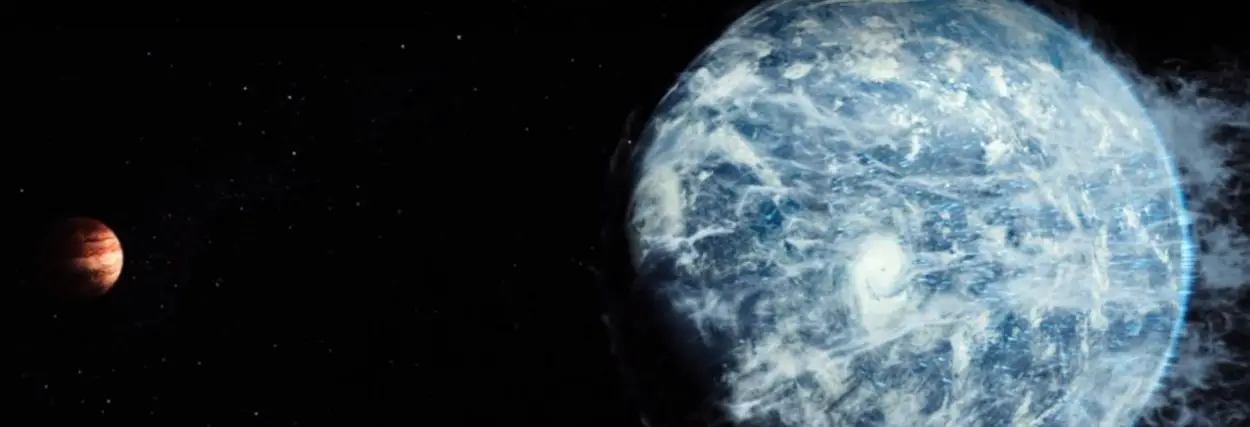
In the distant future, the Sun is dying. Soon it will burn through all its hydrogen and expand to consume half the Solar System (real science, although it’s still a few billion years away so don’t panic). Earth’s impending doom forces the new United Earth Government to implement The Wandering Earth Project. 10,000 Earth Engines are built to push the Earth out of its orbit, and on a 2500-year journey to a new home around a distant star—mind blown, and that is just the premise.
Know what happens? Skip ahead to the crux of the article
Liu Qi (Chuxiao Qu) is young, smart, and a bit of a rebel. Angry at the world for his father, Liu Peiqiang (Jin Wu), leaving when he was four years old, to work on the space station that helps guide Earth. He steals his granddad’s truck licence, and breaks his adopted sister, Duoduo (Jin Mai Jaho), out of school. Together they sneak up to the Earth’s surface using forged documents and a little ingenuity, steal a heavy transport vehicle, and head out over the barren and frozen Earth surface. Disaster hits them, and everyone on Earth, when a Jovian ‘gravitation spike’ shifts and cracks Earth’s tectonic plates, knocking out almost half the giant Earth Engines propelling Earth. Together with their granddad, Han Zi’ang (Man-Tat Ng), the team are caught up in a mission to reignite the Hangzhou Earth Engine.
Wang Lei (Guangjie Li), leader of special ops unit CN171-11, appropriates Qi’s vehicle to transport a lighter core: the ignition key that will restart an Earth Engine. He leads the group through a fragile and frozen Shanghai that crumbles beneath them as more quakes shake the Earth. When they do finally reach Hangzhou, the city, and the Earth Engine, have been destroyed. Young scientist, Li Yiyi (Yichi Zhang), convinces the group to push on to the Sulewasi Torque Engine, which also needed a lighter core. They arrive, only to find that the engine has already been restored, along with almost all the others. But it’s too late, even with the engines back online, the Earth is still falling into Jupiter.
MOSS, the AI aboard the space station initiates the Helios Project: to abandon Earth to its fate and continue the journey with the seeds of humanity and the crew in stasis. Back on Earth, all hope isn’t lost, however. Qi, inspired by the stories told to him by his father, back before the Earth started its wandering journey, has a brain wave: to ignite Jupiter’s atmosphere. The resulting explosion would be enough to push the Earth out of its decaying orbit and back on its journey out to the stars. The mishmash team of soldiers, scientists, and civilians, devise a plan to boost the engine’s jets high enough to reach the hydrogen seeping off the planet’s surface towards Earth.
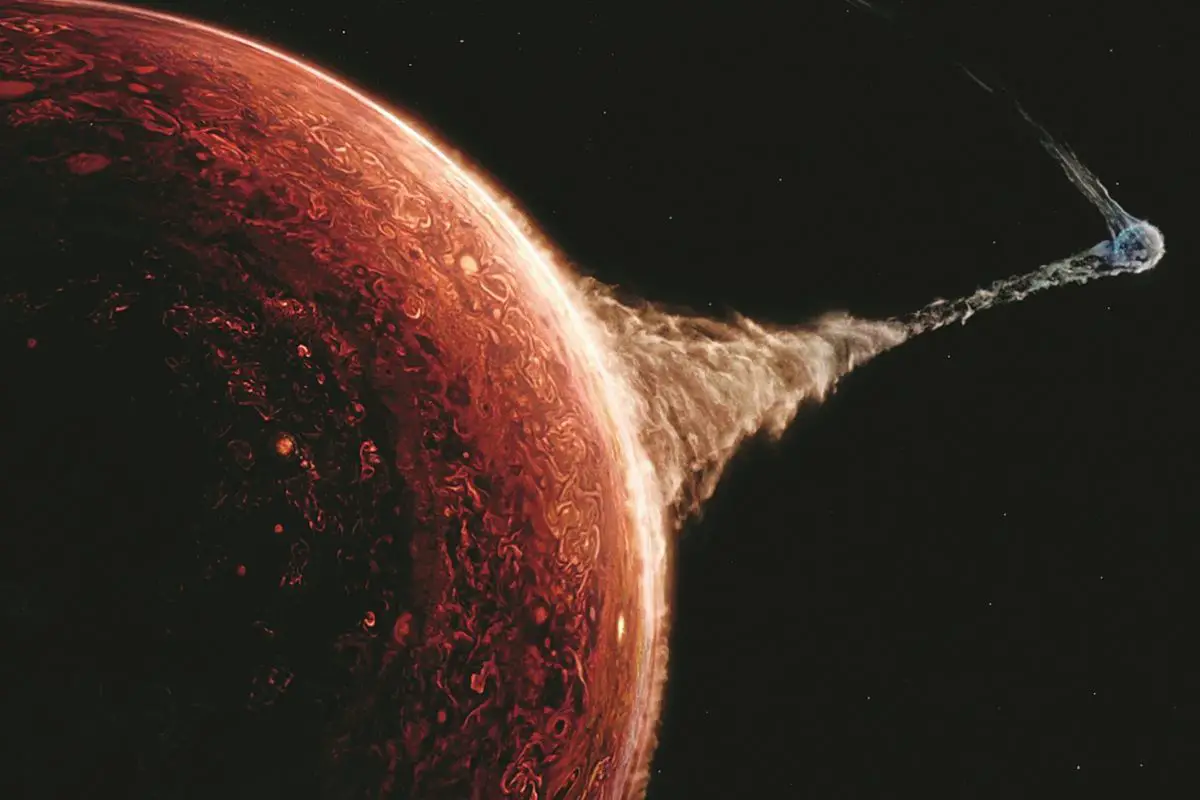
MOSS recounts how the new plan to ignite Jupiter’s atmosphere had already been calculated to have zero chance of success. And it appears the AI is correct. The team’s dramatic efforts to boost the Sulewasi engine’s jet stream high enough to ignite Jupiter’s hydrogen falls short. It seems that all of their efforts were for nothing. That their journey, and Earth’s, has ended. But Peiqiang, driven by love for his son, Qi, has one more idea. With the blessings of the United Earth Government, Peiqiang jettisons the crew and flies the space station, loaded with fuel, right into Sulewasi’s jet stream, sacrificing himself to save the Earth. The explosion breaches the gap, igniting Jupiter’s hydrogen. The plan is successful. The Earth is pushed away from Jupiter and able to continue on its 2,500-year journey.
Let’s get into some detail
The Wandering Earth is good science fiction, pure and simple. We’ve seen doomsday films before, but rather than building arks, or escaping underground, or everyone dying just to make the point (we heard you), the Earth blasts out of the Sun’s orbit and is flown like a spaceship across the Milky Way. It’s novel and ambitious, and that’s so refreshing to watch. It’s not over-complex either: we must move Earth > we build engines > we move Earth. Don’t get me wrong, as far as actual science goes it’s pretty fringe, but it’s not actual science, it’s fiction. The reality isn’t as important as consistency, and this is as well thought out as any of the great SF blockbuster films to date. What that means for us, is an immersion into a world that’s easy to follow and enjoy without physics, psychology, or philosophy, PhDs.
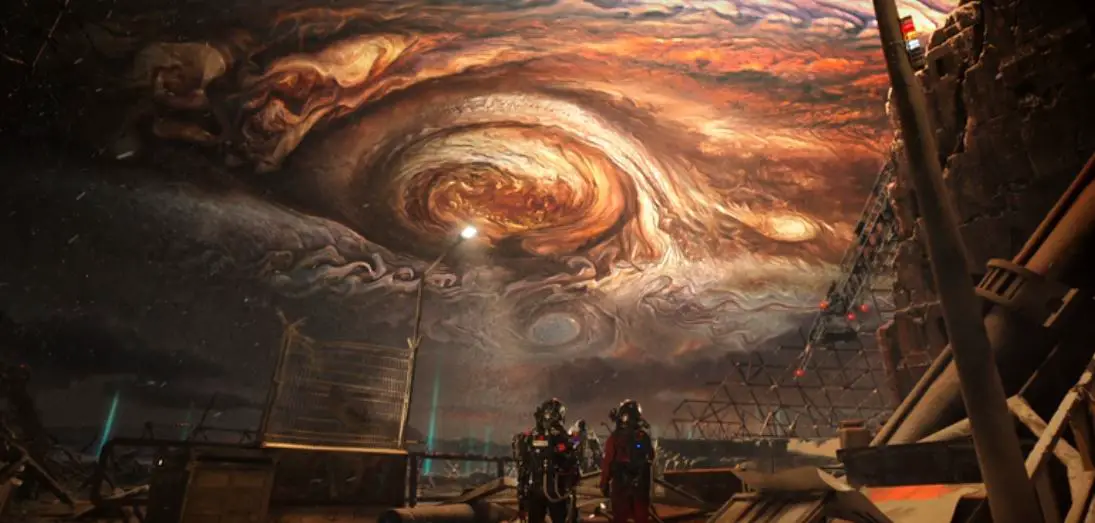
On the surface, The Wandering Earth’s simple entertainment factors may seem to miss the deep-and-meaningful social reflections that plague most contemporary Sci-Fi film and television. But that’s a good thing. I find myself putting off watching many Sci-Fi films if just because they’re too much hard work to enjoy. Science fiction has become more complex and more detailed, or so overtly commentary that it can feel preachy, or even worse, moany. Fiction should make you think without trying to make you think, and this film certainly does that. Sci-Fi also doesn’t necessarily need to revolve around the Big questions: what is life? Humanity? The environment? It only needs to spark the imagination just enough to ask, ‘what if?’ and The Wandering Earth leaves us wondering just that. When the Sci-Fi concepts in a film spark articles such as Emily Rome’s Inverse article, “Could ‘The Wandering Earth’ Actually Happen? Here’s What a NASA Engineer Says”, it’s safe to say the fiction has served its Sci-Fi purpose.
Part of what makes The Wandering Earth good Sci-Fi blockbuster entertainment is its balance between Sci-Fi tropes and done-to-death cliches. Many Sci-Fi films go out of their way to avoid Sci-Fi tropes and by doing so, cast themselves further from the familiarity of the genre. The Wandering Earth goes ahead and packs dozens of tropes and a few cliches into its two-hour run time. The protagonist is a cocky child genius, with daddy issues, discontent with his world. There’s a crack special forces team bent on completing their mission, who fire guns into the air in frustration. There’s an overbearing AI dooming Humanity by following orders down to the letter; there is keyboard bashing and vague science explanations. There’s an underground city, a countdown, a sky beam, a call to arms, an appeal to hope, and even a mythical gravitational spike, yet. Yet! It all works. The film doesn’t revolve around any of these tropes because it doesn’t have to. Instead, they’re sprinkled through original concepts like driving over planetary ice shelves, earth engines and, best of all, flying the planet like a spaceship! Each trope letting us fall a little deeper into the fiction without even trying.
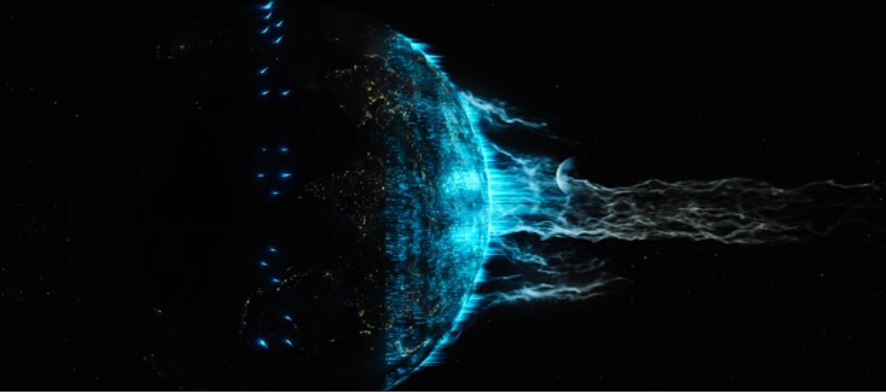
The characters in The Wandering Earth do fall a little more on the cliché side, however. There’s the plucky scientist, the comic guy, the scared engineer, the tough chick, which all have their purpose, and are all played to their strengths to bring what the film needs at any given point. In an indie Sci-Fi film, these characters wouldn’t work. But this is action Sci-Fi bordering on young-adult fiction. Sticking to well-defined archetypes shows us who these people are, and how they fit into the story, without spending time going into details. That’s not to say the characters lack in complexity. Quite the opposite. Everyone, especially Qi, Peiqiang, and Zi’ang battles their own demons, overcoming them to… yada yada yada. There isn’t anything lacking, but there’s nothing that’ll stay with you long after the credits roll. That’s not such a bad thing though, because, at its core, it’s a blockbuster. This is a story about Earth crashing into Jupiter, (which definitely stays with you long after the films over). The characters are tools in driving that plot, and they do it with textbook precision.
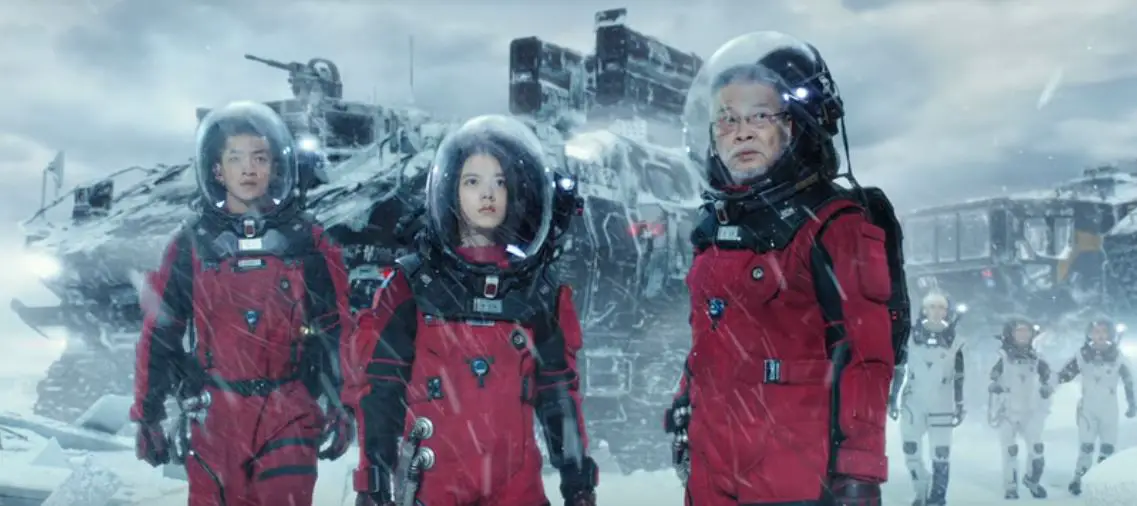
It’s what these heroes are fighting against that really cements The Wandering Earth as a Sci-Fi gem and sets it apart from the lower ranks of science fiction films. There’s no bad guy or evil gal. There’s no malicious, antagonist plotting against humanity, or trying to escape, or replicate, or annihilate. There are only circumstances beyond control, and the only way to fight against it is with perseverance and ingenuity. There is, however, MOSS: the HAL 9000 A.I. knockoff capable of murder. It could be argued that it is the antagonist, and while it certainly is an antagonist, it’s not the evil that the plot centers around. Apart from Peiqiang, no one is fighting against it. MOSS serves more as a dramatic exposition device than anything else. It’s safe to say the only enemy is that darn (completely fictional) gravitational spike. To watch people versus a problem is a breath of fresh air, and it highlights the originality of the plot. It’s so novel; it can stand on its own without being driven by a character’s motivation. I’m not sure many Sci-Fi films can boast that level of ingenuity these days. Let me know if you disagree in the comments.
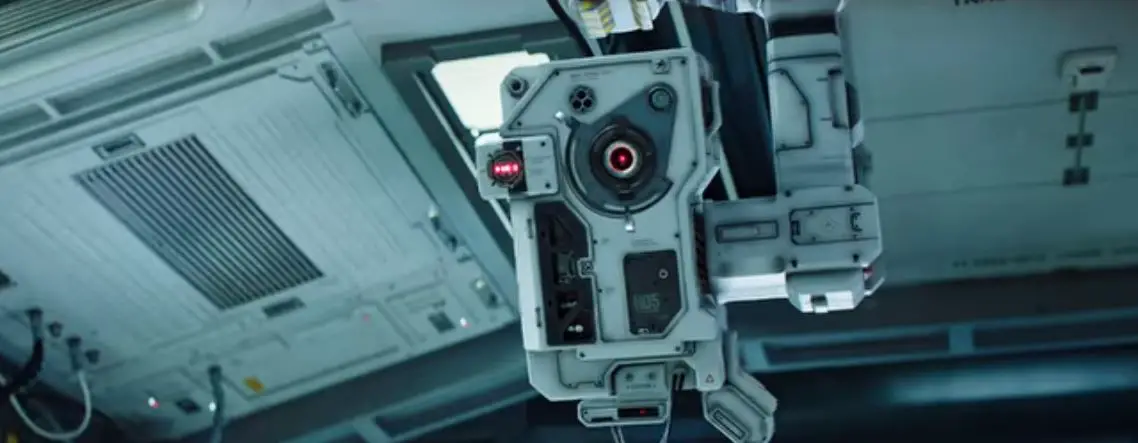
At first glance, The Wandering Earth fits neatly into the blockbuster-science-fiction-disaster-movie genre. It’s lighter than Interstellar, or Sunshine, for example, granting room for large, outlandish, and imaginative new science fiction concepts that viewers aren’t supposed to think too hard about. It’s also not overtly commentary like Snow Piercer or Geostorm. That is, whatever commentary you glean from the story is only secondary to the plot. The film also breaches one more genre gap: young adult fiction. You may hardly notice it while watching (evidence of perfect application for me), but the tone early on dips into Young Adult Sci-Fi, with its young protagonist, school escape, and comical opening action sequence. It’s this Young Adult genre element that allows us to forgive the outlandish Sci-Fi concepts, the simple character archetypes, the science fiction tropes, and the—let’s face it— sometimes corny one-liners. Without this Young Adult tone, we wouldn’t be able to sit and enjoy it for what it is: Blockbuster. Entertainment. Science fiction.
The Wandering Earth is worth a watch if you’re after science fiction of epic proportions that looks beautiful. If you want to be entertained! It packs a lot into a small space. So much that it’s almost —almost, bursting at the seams. It’s saved by being well thought out, using accessible tropes and characters that allow immersion into the universe without too much hard work on the part of the viewer. It’s a shining example of how great blockbuster science fiction can be when the underlying premise is entirely original. And finding unique premises seems to be getting harder and harder these days, so make the most of it while you can.



